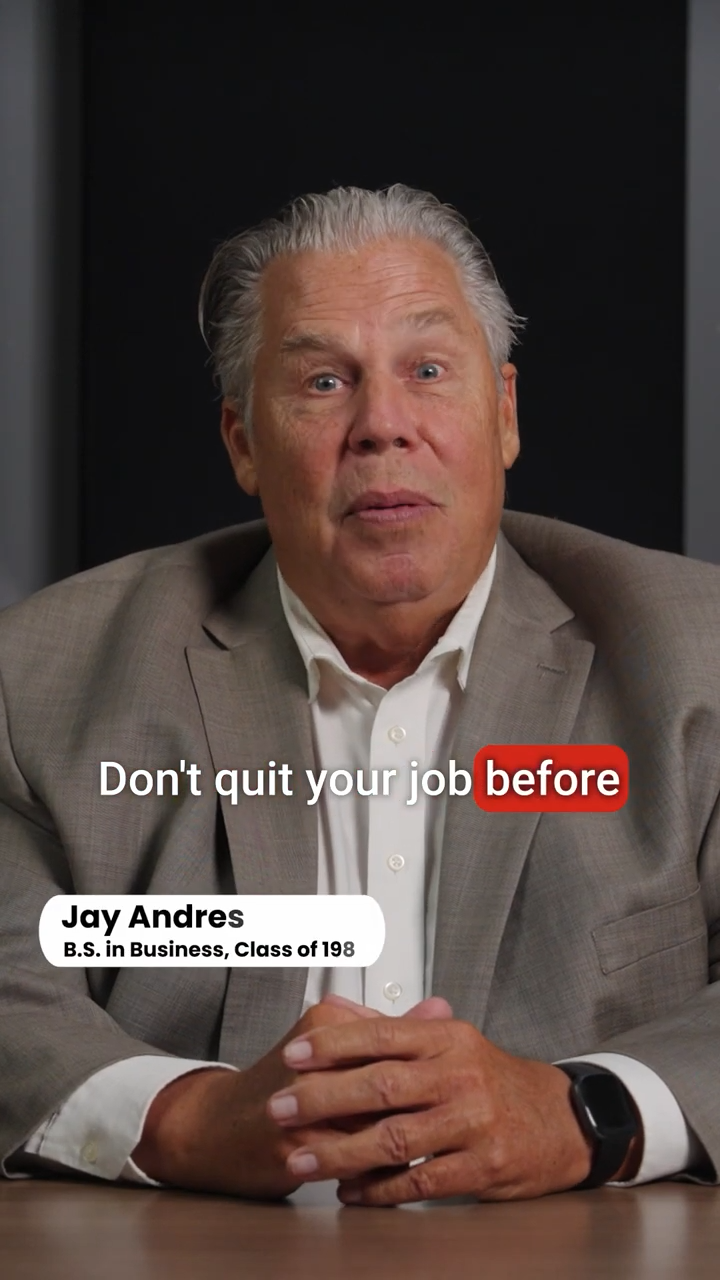Etiquette for how to resign from a job

Written by Claire O'Brien

Reviewed by Jessica Roper, MBA, director of Career Services at University of Phoenix

While there are plenty of reasons to change careers, taking the time to update your resumé, apply, interview, and then apply and interview again and again can be stressful. That doesn’t even factor in the potential stress of finally telling your co-workers and managers that you’re leaving. Let’s discuss what to consider and how to resign from a job in a way that protects your reputation and professionalism.
What to consider before deciding to resign from a job
Bad management? Better opportunities? Let’s count the reasons people employeeswant to resign from a job
No growth opportunities
Moving up within a company motivates employees to stick with a job. Even if someone might not receive an annual promotion, the sense they can grow is important.
On the other hand, being passed over for a promotion can be disheartening, especially after years with one company. So much so that it might justify leaving, or at least considering whether they should resign from a job.
Employees often find themselves in three stages within a job or career they like:
1. Stay-cate: You like your position and don’t want to move, so you develop new responsibilities closely aligned with your existing role. Example: A marketing assistant designing and spearheading a social media campaign.
2. Update: You like your role but want to grow, so you take your existing position in a new direction. Example: A marketing assistant is promoted to marketing manager, overseeing general marketing operations.
3. Innovate: Your role is old news, so you take your career in a different direction with new responsibilities — and opportunities. Example: A marketing assistant moves to the financial team.
Recognizing where you are in the process can help you make a good decision, including whether to stay or move on. It can also help you in the resignation process by clarifying where you would have liked to grow more and what kind of work you want to perform in the future.
Clashes with management
Understanding and articulating the reasons for wanting to resign from a job isn’t about being critical toward the employer. It’s about relaying in a constructive, professional way why you’re moving on. Your soon-to-be ex-employer may not even be aware of problems that have motivated your resignation. Your resignation letter can serve as an opportunity to address those issues for employees still with the company.
Professional collaboration requires the successful alignment of several personality types, but it may not always work as well as expected. Some employees have horror stories of managers who bullied or humiliated their employees. Others have less dramatic stories that are still negative.
If this sounds familiar, you’re not alone. According to Pew Research, a 2021 survey found that 57% of people quit a job because they felt disrespected at work. While this may or may not be tied directly to management, it’s a strong indication that employees take action when they do not feel supported or respected in their position.
An untenable work–life balance
Johnson has worked with a wide range of people, from experienced professionals to recent high school graduates. She’s noticed a changing emphasis on work–life balance. For some people, spending eight hours in the office and working extra time can feel comfortable and familiar. Other cohorts, such as Gen Z and millennials, tend to emphasize the importance of time spent outside of work.
No matter where you fall on the work–life-balance spectrum, the fact that this spectrum exists is what matters. No one wants to work more than they have to, and even those hardworking employees might think twice if they see co-workers fleeing for greener, more balanced pastures. When businesses can’t cultivate a healthy balance between time on and time off, in other words, employees might search for companies with more progressive policies.
Is a resignation letter still required?
Younger generations may consider notifying their boss of their intent to resign from a job as an archaic workplace formality (like pantyhose!) However, in today’s rapidly changing, post-Great Resignation work environment, in which job hopping has become commonplace and company loyalty is less expected than ever, resigning amicably is crucial for maintaining a professional reputation and future prospects.
In today’s workplace culture, most companies don’t require a formal resignation letter when you quit your job. But providing one is still a professional courtesy and can ensure a smooth transition for your employer.
It’s best practice to set up a time to speak with your direct manager to inform them of your decision. Follow that conversation up with a resignation letter that formalizes your decision to leave and includes your expected last day of employment and any other relevant information to your final weeks of work.
It’s also a good idea to check your company manual or speak to your human resources department for specific guidelines before turning in your notice. Doing so will ensure you have all the information you need regarding benefits, your last paycheck and the return of company equipment.
If it’s not required, why write a resignation letter?
While not always necessary, writing a resignation letter offers several benefits to both you and your employer.
Its most important function is to start the official paper trail regarding the circumstances of your departure. It gives your boss a chance to come to terms with your leaving and begin looking for a replacement.
This is what makes a resignation letter a closing opportunity to demonstrate your professionalism and commitment to maintaining positive relationships with past employers.
After all, you might not expect to be a boomerang employee (people who return to their previous employers after quitting), but it’s a growing trend. A recent survey found that almost 20% of the employees who had quit during the pandemic returned to their previous employers. Therefore, when you resign from a job, do so on the best terms possible to keep future opportunities available.
How to write a resignation letter
This does not need to be complicated — a short formal resignation letter is the way to go. Include your name, position, the date of resignation and the intended last day of work in the first paragraph.
You do not need to elaborate extensively on your reasons for resigning. Still, a brief explanation can be appropriate — use your judgment. Use variations on the life-change situation to explain your reason for departure:
- You have a new job opportunity.
- You’re moving.
- You’re going back to school.
Resist the urge to criticize or complain about the company, your boss or your colleagues in your resignation letter, even if you had a negative experience. Instead, focus on the positive aspects of your time with the company and express your appreciation for your opportunities. Even if you’re sure you’ll never return to that employer, you will likely need a reference letter at some point.
What about resigning over email?
In today’s virtual workplaces, notifying your boss that you’re quitting will inevitably happen over email. Follow the guidelines for a written resignation letter (short, sincere and inclusive of relevant information only) but remember to choose an appropriate subject line.
Put your name and the word “resignation” in your subject line (e.g., “Notice of Resignation – Tyler Matthews”). This way, a supervisor can easily find the resignation letter email and pass it along to interested parties, like human resources, to start the off-boarding process.
Remember, several employees at the company will undoubtedly see emailed resignations, so triple-check your letter for a professional tone.
Should a resignation be shared on social media?
Generally, it’s best to wait until your transition to your new job is finalized before taking your announcement to LinkedIn.
Although participating in TikTok trends like #quietquitting and #quittok might be tempting, doing so may cause lasting damage to your “hireability.” Instead, take time to think clearly. And when you post, keep it professional, knowing that future and past employers will see your messages.
How should bosses respond to an employee resigning?
Bosses must remember that employment is a two-way street and must refrain from taking an employee’s resignation personally. Employees have a right to decide what is best for them and their career. An employee’s decision to resign from a job and move on shouldn’t be viewed negatively. Resigning workers should be treated with support, grace and respect for their decisions.
Delivering bad news to an employer, such as the resignation of a workplace standout like yourself, is never easy. However, doing so with confidence and grace is a vital workplace soft skill that will serve you well after moving on from a job.
You are, after all, your own brand. Make sure it’s one that hiring managers want.
Need more advice on how to resign from a job?
Need assistance about how to resign from a job, resumés or any other career guidance? Active University of Phoenix students and graduates have a team of career advisors to help them take that next step. Learn more about the Career Services for Life® commitment, and get career insights every week via University of Phoenix’s LinkedIn newsletter.

Sarah Rodriguez, MBA
Senior Human Resources Partner
"Above all, keep it professional. Even if you’re leaving a bad work environment, focus on the future. Going out in a ‘blaze of glory,’ as we sometimes see going viral on LinkedIn and other sites, can damage your personal brand as outsiders don’t have the context to your personal experiences.”
Need help with the decision to resign from a job? Watch this video Quitting Your Job: 3 Things To Consider.

ABOUT THE AUTHOR
Claire O’Brien has led copywriting teams for Hilton Worldwide Corporate’s creative studio and advertising agencies specializing in the real estate, hospitality, education and travel industries. In 2020, she founded More Better Words, a boutique copywriting agency that taps into her global connections. She lives in Costa Rica with her husband and six rescue dogs.
This article has been vetted by University of Phoenix's editorial advisory committee.
Read more about our editorial process.
Read more articles like this:



